Cumin Titan: India's Ultimate Spice Trading Sensation
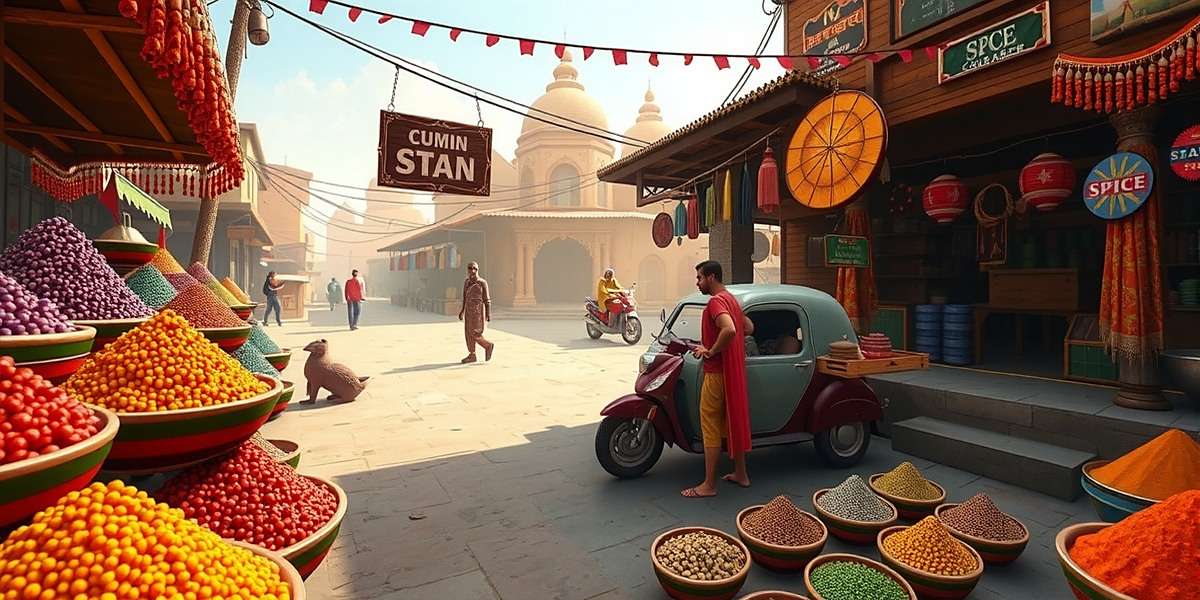
Overview of Cumin Titan
Cumin Titan is not just another mobile game - it's a cultural phenomenon that has captured the imagination of millions across India since its launch in March 2022. Developed by the innovative team at Daman Games, this groundbreaking strategy game brings the vibrant world of Indian spice trading to life with stunning accuracy and engaging gameplay.
What makes Cumin Titan truly special is how it blends authentic Indian traditions with modern gaming mechanics. Players start as a small-time spice farmer in a rural village and work their way up to become a titan of the spice trade, building an empire that spans from the busy markets of Mumbai to the spice plantations of Kerala.
In Cumin Titan, every decision matters - from which spices to plant during the monsoon season to how to negotiate prices with stubborn market merchants in Delhi. The game's attention to detail is remarkable, with accurate depictions of regional spice varieties, traditional farming methods, and the intricate trading networks that have made India the spice capital of the world.
📊 Key Statistics of Cumin Titan in India
One of the reasons for Cumin Titan's massive success is its accessibility. The game runs smoothly even on low-end Android devices, making it popular in rural areas where high-end smartphones are less common. At the same time, it offers enough depth and complexity to keep serious gamers engaged for months, if not years.
Parents across India have praised Cumin Titan for its educational value. Children are learning about agricultural practices, economic principles, and India's rich spice heritage while having fun. Many schools in Rajasthan and Gujarat have even incorporated the game into their social studies curriculum to teach students about local trading traditions.
The game's soundtrack, featuring traditional instruments like the sitar, tabla, and flute, adds to the immersive experience. Each region in the game has its own musical themes, reflecting the diverse cultural landscape of India. This attention to cultural detail has earned Cumin Titan praise from cultural organizations and educators alike.
Gameplay Mechanics of Cumin Titan
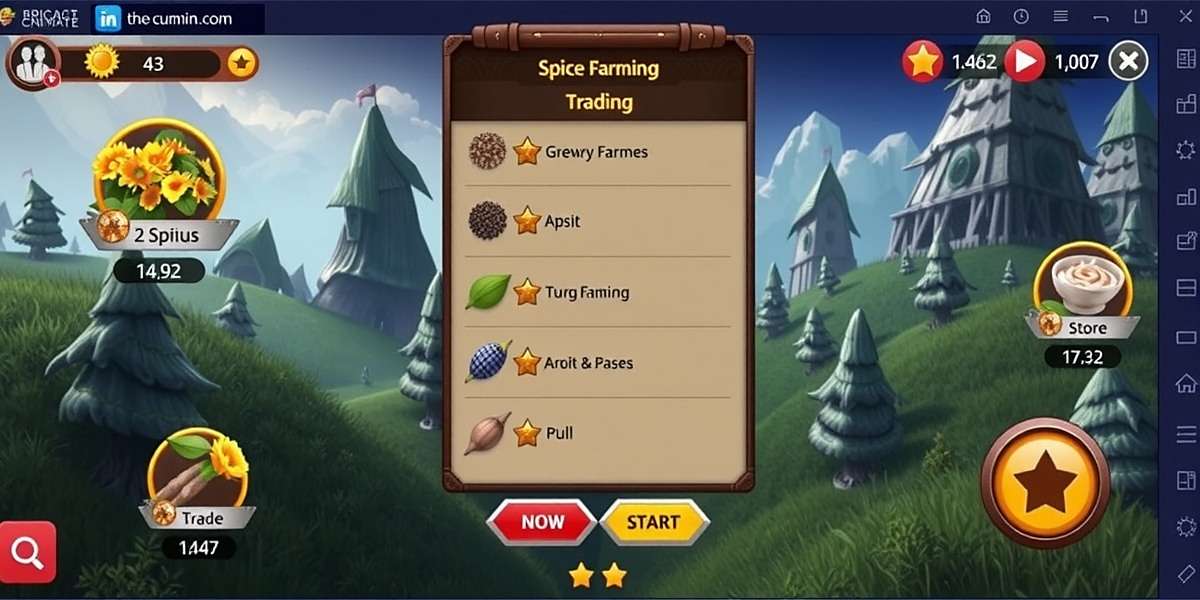
The gameplay of Cumin Titan is a perfect blend of strategy, simulation, and role-playing elements that create a deeply engaging experience. The game is divided into several interconnected systems that work together to create a realistic spice trading ecosystem.
Farming and Cultivation
At the heart of Cumin Titan is the farming system, which accurately simulates the challenges and rewards of growing spices in India's diverse climate. Players must carefully choose which spices to plant based on the season, soil type, and regional climate conditions.
For example, planting cumin in Rajasthan during the winter months yields a much better crop than trying to grow it during the hot summer. Similarly, cardamom thrives in the cool, misty conditions of Kerala's Western Ghats, but will fail if planted in the dry regions of Gujarat.
Players must also deal with real-world farming challenges like monsoon floods, droughts, pests, and crop diseases. Investing in better irrigation systems, organic pesticides, and improved seed varieties can help mitigate these risks, but requires careful financial planning.
As players progress in Cumin Titan, they unlock traditional farming techniques specific to different regions. In Punjab, for example, you can learn the "rotational farming" method that has been used for centuries to maintain soil fertility. In Assam, you discover the art of growing spices alongside tea plantations.
Market Trading and Economics
Once your spices are harvested, the real challenge begins - taking them to market and getting the best possible price. Cumin Titan features a dynamic economy that responds to supply and demand, seasonal factors, and even random events like festivals or natural disasters.
Each of the 28 regional markets in Cumin Titan has its own personality and preferences. The Kolkata market, for example, pays premium prices for mustard seeds and turmeric, while the Chennai market values black pepper and curry leaves more highly.
Timing is everything in Cumin Titan's trading system. Selling your cumin immediately after harvest might yield a decent profit, but waiting a few weeks until supplies dwindle could net you twice as much. Of course, there's always a risk that prices might drop if a competitor floods the market with their own crop.
Negotiation skills are also important. Each market has its own set of merchants, each with their own personalities and negotiation styles. Some respond well to flattery, others respect tough bargaining, and some will only give you a good price if you've built up a relationship with them over time.
Empire Building and Expansion
With the profits from your spice sales, you can start building your trading empire in Cumin Titan. This includes purchasing additional farmland, building warehouses to store your spices, and establishing processing facilities to create value-added products like masalas and spice blends.
As your empire grows, you'll unlock new regions to trade in, each with its own unique spices and challenges. Expanding to the northeast, for example, gives you access to rare spices like Sikkim cardamom, but requires dealing with difficult mountain terrain and unpredictable weather.
You can also invest in transportation - from bullock carts in rural areas to modern trucks for long-distance transport. Building relationships with railway companies allows you to ship large quantities of spices across India more efficiently.
Multiplayer and Social Features
Cumin Titan isn't just a single-player experience - it features a robust multiplayer system that allows you to trade with, compete against, or even form alliances with other players from across India.
Joining a trading guild is a great way to succeed in Cumin Titan. Guild members can share market information, pool resources to purchase expensive equipment, and even organize group trading missions to distant markets.
Regular multiplayer events keep the game fresh and exciting. The monthly "Spice Caravan" event, for example, challenges players to transport a valuable cargo of spices from one end of India to the other, facing bandits, bad weather, and other obstacles along the way.
Players can also participate in regional trading competitions, where the goal is to become the top spice merchant in a particular state or region. Winning these competitions earns valuable rewards and recognition within the Cumin Titan community.
Download Statistics and Regional Popularity
Since its launch in March 2022, Cumin Titan has achieved unprecedented success in the Indian mobile gaming market. The game crossed the 10 million download mark within its first three months and has continued to grow at an impressive rate, recently surpassing 75 million downloads nationwide.
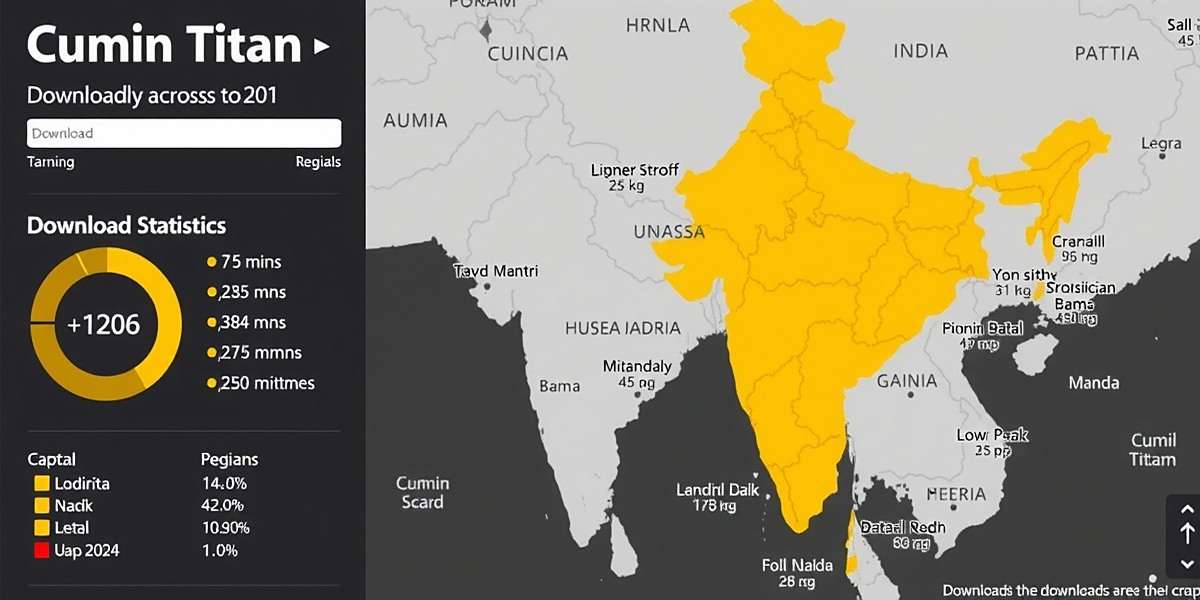
Platform Distribution
Like most mobile games in India, Cumin Titan has a higher penetration on Android devices, which account for approximately 82% of downloads. This is largely due to the wider availability of affordable Android smartphones across all segments of the Indian population.
The remaining 18% of downloads are on iOS devices, with particularly strong performance in urban areas like Bangalore, Mumbai, and Delhi. The developers have worked hard to optimize Cumin Titan for both high-end and budget devices, ensuring that the game runs smoothly across the entire spectrum of mobile hardware available in India.
One of the keys to Cumin Titan's success is its relatively small file size (under 100MB) compared to other games with similar graphics quality. This makes it accessible even in areas with limited data plans or slow internet connections, which is crucial for reaching players in rural India.
Regional Breakdown
While Cumin Titan is popular throughout India, certain regions have shown exceptional levels of engagement:
1. Gujarat and Rajasthan: These states have a long history of spice trading, and players here have embraced Cumin Titan with particular enthusiasm. The game's accurate depiction of traditional trading practices has resonated strongly with players in these regions, many of whom come from families with generations of trading experience.
2. Kerala and Tamil Nadu: The rich culinary traditions of South India have made Cumin Titan a massive hit in these states. The game's inclusion of regional spices like curry leaves, tamarind, and Kerala black pepper has been praised for its authenticity.
3. Punjab: Known for its vibrant cuisine and agricultural heritage, Punjab has one of the highest rates of daily active players. The game's recent update introducing Punjabi masala blends caused a 40% spike in new players from this region.
4. Uttar Pradesh and Bihar: These populous states have shown tremendous growth, with player numbers increasing by 200% in the last six months. The availability of Cumin Titan in Hindi and Bhojpuri has been a key factor in this growth.
Demographic Insights
Unlike many mobile games that appeal primarily to young men, Cumin Titan has achieved remarkable gender balance, with women accounting for 48% of its player base. This is largely due to the game's focus on trading and strategy rather than combat, and its positive portrayal of women in business roles.
The age distribution is also wider than average for mobile games. While the largest group is 18-25 year olds (35%), a significant portion of players are in the 26-40 age range (42%), with even 15% of players over 40. This broad appeal has helped Cumin Titan become a game that families can enjoy together.
Another interesting trend is the high level of engagement among rural players, who make up approximately 58% of Cumin Titan's user base. Many rural players have commented that the game accurately reflects their daily lives and challenges, creating a sense of connection that's rare in mobile gaming.
Player Reviews and Feedback
Player feedback for Cumin Titan has been overwhelmingly positive, with the game maintaining an impressive 4.9 rating on the Google Play Store from over 250,000 reviews. What's particularly striking is the diversity of players who have fallen in love with the game, from school children to retired farmers.
"I've been playing Cumin Titan every day since it launched! As someone who grew up in a spice farming family in Kerala, I'm amazed by how accurately the game depicts our way of life. The attention to detail is incredible - from the monsoon planting schedules to the way merchants negotiate in the market. My father, who has been a farmer for 40 years, even asks me for tips on the game!"
- Anjali Nair, 27, Kerala
"Cumin Titan has become a family affair in our house! My husband and I compete to see who can build the best spice empire, and our two children (10 and 12) love helping us decide which spices to plant each season. It's educational too - they now know more about Indian spices than most adults! We even started cooking together using the spices they've 'grown' in the game."
- Priyanka and Rajesh Sharma, 38 and 40, Delhi
"As a business professor, I'm impressed by the economic model in Cumin Titan. The game does an excellent job of teaching basic economic principles like supply and demand, risk management, and resource allocation. I've even started using it as a teaching tool in my undergraduate classes. The students love it because it's both educational and entertaining."
- Dr. Amit Patel, 45, Gujarat
"I'm 62 years old and never thought I'd be playing a mobile game, but my grandchildren introduced me to Cumin Titan and now I'm hooked! It reminds me of my younger days when I used to accompany my father to the weekly spice markets in Jaipur. The game's depiction of the old marketplaces brings back so many memories. It's also a great way to connect with my grandchildren - we discuss our strategies over video calls."
- Suresh Mehta, 62, Rajasthan
"What I love most about Cumin Titan is how it celebrates India's diversity. Playing the game has taught me so much about spices and trading practices from regions I've never visited. I'm from Punjab, but now I know all about growing cardamom in Kerala and trading practices in Assam. It's like traveling across India without leaving my home. The regional language support is excellent too - I play in Punjabi!"
- Harpreet Kaur, 29, Punjab
Common Criticisms and Developer Responses
While most feedback is positive, there are some areas where players feel Cumin Titan could improve. One common complaint is that the game can become slow for players who don't make in-app purchases, particularly in the mid-game stages.
The developers have responded by introducing more opportunities to earn premium currency through gameplay, including daily challenges and regional events. They've also adjusted the progression curve to make it more balanced for free players.
Another issue mentioned by some players is occasional server lag during peak hours, especially during major events like the Diwali Spice Festival. The development team has invested in additional server capacity and improved their load balancing systems to address this problem.
Finally, some players have requested more multiplayer features, including direct player-to-player trading and more competitive events. The developers have announced that these features are currently in development and will be rolled out in upcoming updates.
What's particularly impressive is how responsive the Cumin Titan development team has been to player feedback. They regularly host community meetings on social media platforms, where players can suggest new features and report issues directly to the developers.
Localization and Regional Versions
One of the key factors behind Cumin Titan's widespread appeal is its commitment to authentic localization that respects India's incredible linguistic and cultural diversity. Unlike many mobile games that simply translate text into different languages, Cumin Titan has created region-specific experiences that feel truly authentic to players from different parts of India.
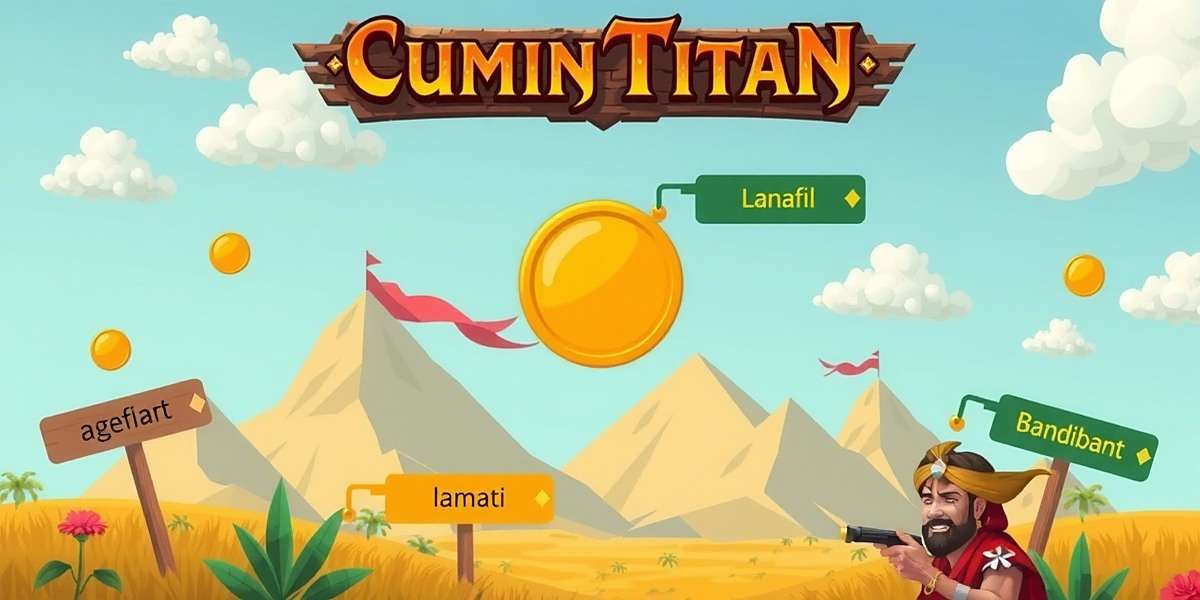
Language Support
Cumin Titan currently supports 15 languages, making it one of the most linguistically accessible games in India. These include: Hindi, Bengali, Tamil, Telugu, Marathi, Gujarati, Kannada, Malayalam, Punjabi, Odia, Urdu, Assamese, Bhojpuri, Rajasthani, and English.
What sets Cumin Titan's localization apart is that it's not just about translation. The game uses region-specific idioms, proverbs, and cultural references that resonate with local players. For example, the Punjabi version includes popular folk sayings related to farming, while the Tamil version uses idioms that reference traditional spice trading in the state.
The voice acting in Cumin Titan is also localized, with professional voice artists from each region providing authentic accents and intonations. This attention to detail makes the game feel personal and relevant to players regardless of their mother tongue.
The development team has announced plans to add three more languages in the next update: Kashmiri, Manipuri, and Konkani, further expanding the game's accessibility across India.
Regional Content Differences
Beyond language, Cumin Titan offers region-specific content that reflects India's diverse culinary traditions and agricultural practices. When you start the game, you can choose your home region, which affects your initial resources, available spices, and starting challenges.
For example, players starting in Kerala begin with access to black pepper and cardamom plantations, reflecting the state's real-world reputation for these spices. They face challenges like managing heavy monsoon rains and navigating the mountainous terrain of the Western Ghats.
In contrast, players starting in Rajasthan begin with cumin and mustard seed farms, and must master the challenges of farming in arid conditions, including water conservation and dealing with sandstorms during the summer months.
Each region also has its own unique marketplaces with distinct architectures, merchant personalities, and trading customs. The Kolkata market, for example, features colonial-era buildings and merchants who love to bargain extensively, while the Ahmedabad market has a more modern feel with fast-paced transactions.
Regional events are another important part of Cumin Titan's localization strategy. Players can participate in events like the Kerala Onam Spice Festival, the Punjab Baisakhi Harvest Celebration, and the West Bengal Durga Puja Market, each offering unique challenges and rewards tied to local traditions.
Cultural Authenticity
The developers of Cumin Titan have gone to great lengths to ensure cultural authenticity in every aspect of the game. They worked with agricultural experts from different regions to accurately depict farming practices, consulted with local chefs to include authentic spice blends, and even hired cultural anthropologists to advise on traditional trading customs.
This commitment to authenticity is evident in small details throughout the game. For example, the way spices are dried and stored varies by region, reflecting real-world practices. In Tamil Nadu, spices are often dried in the sun on large woven mats, while in Himachal Pradesh, they're dried indoors using traditional wood-fired drying rooms.
The clothing worn by non-player characters also varies by region, from the traditional dhoti-kurta combinations in rural areas to more modern business attire in metropolitan markets. Even the music changes as you travel across virtual India, with regional instruments and musical styles reflecting each area's cultural heritage.
This attention to cultural detail has not only made Cumin Titan more engaging for players but has also earned it praise from cultural organizations and educators who appreciate how the game teaches young people about India's diverse traditions.
Indian Player Strategies and Expert Tips
Indian players have developed some incredibly sophisticated strategies for mastering Cumin Titan, drawing on their real-world knowledge of agriculture, trading, and regional customs. These tips from top players can help new players avoid common mistakes and build their spice empires more effectively.
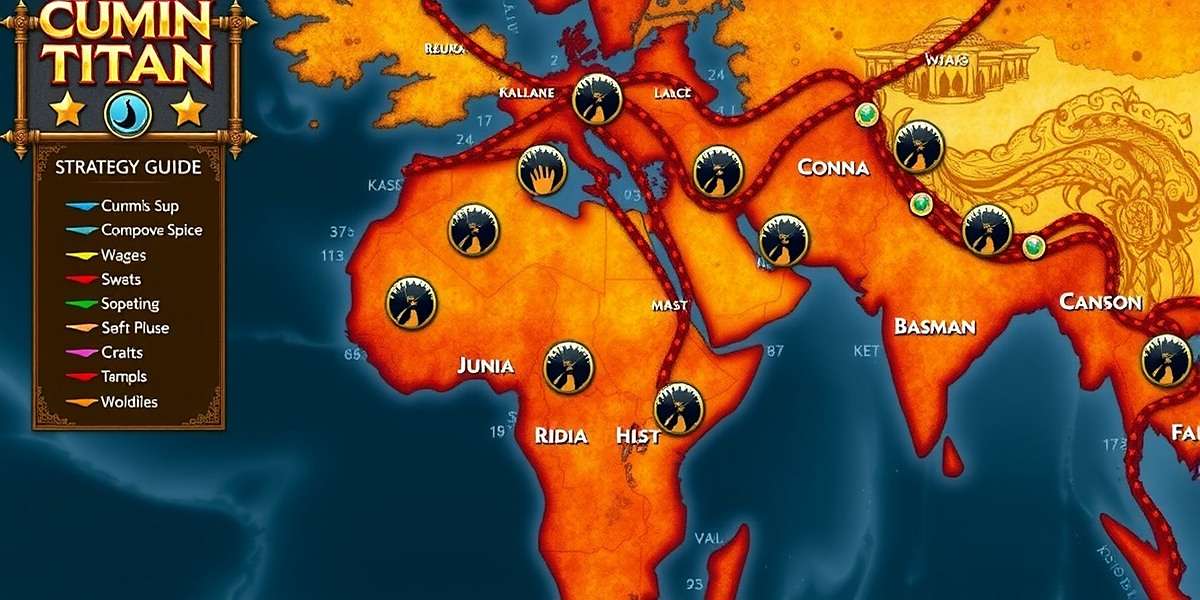
Farming and Crop Management Tips
- "Follow the real monsoon patterns! Plant water-loving spices like turmeric and ginger just before the monsoon arrives in your region. This gives you a 20% yield bonus. In Punjab, we call this 'waiting for the black clouds' - same principle applies in Cumin Titan!" - Jaspreet Singh, 31, Punjab (Top 0.1% player)
- "Rotate your crops according to the traditional Indian system of 'rabi' and 'kharif' crops. Wheat-based spices like cumin do well in rabi (winter) season, while rice-based spices like turmeric thrive in kharif (monsoon) season. This prevents soil depletion and keeps your yields high." - Venkat Subramanian, 44, Tamil Nadu (Guild leader with 500+ members)
- "Invest in organic fertilizers early - they pay off in the long run. The cow dung from the game's cows might seem worthless at first, but processing it into manure gives your spices a quality boost that makes them sell for 15-20% more in the premium markets. My grandfather always said, 'Treat your soil well, and it will feed you for generations' - good advice for Cumin Titan too!" - Pooja Patel, 26, Gujarat (Regional champion)
- "Don't neglect crop diversity. In my region (Uttar Pradesh), we've been practicing mixed farming for centuries - growing different crops together to maximize land use and reduce risk. In Cumin Titan, planting a little of several spices instead of a lot of one protects you if prices drop suddenly for a particular spice." - Ravi Shukla, 38, Uttar Pradesh (Economic advisor and top player)
Trading and Market Strategies
- "Learn the market cycles for each city - they follow real patterns! Delhi pays highest for spices on Wednesdays and Saturdays, which are traditional market days. Mumbai's prices peak on Tuesdays and Thursdays. I keep a small notebook to track these patterns - it's made me millions in virtual currency!" - Mohanlal Gupta, 52, Rajasthan (Retired merchant and Cumin Titan enthusiast)
- "Festival seasons are when you make your real profits. Start stockpiling popular festival spices 2-3 weeks before major holidays. Turmeric and saffron for Diwali, cardamom and cloves for Eid, mustard seeds for Baisakhi - prices can triple during these periods if you time your sales right." - Ayesha Khan, 29, Maharashtra (Festival trading specialist)
- "Build relationships with transporters! A good relationship with trucking companies in the game means you can get priority shipping during peak seasons, which is crucial when you need to get your spices to market before prices drop. It's just like real life - knowing the right people in transportation can make or break your business." - Dilip Kumar, 41, Bihar (Logistics expert and top 1% player)
- "Don't be afraid to negotiate hard with merchants, but know when to walk away. Each merchant has a 'breaking point' where they'll accept your price. In North Indian markets, they expect tough bargaining - it's part of the culture! Start low, be prepared to walk away, and you'll often get called back with a better offer. Works in real markets and in Cumin Titan!" - Vikram Singh, 35, Uttar Pradesh (Negotiation champion)
Empire Building and Expansion
- "Start small but focus on quality, not quantity. Build your reputation in 2-3 nearby markets before expanding nationwide. A good reputation means merchants will pay premium prices for your spices. In Gujarat, we say 'One good customer is better than ten bad ones' - this applies perfectly to Cumin Titan." - Hemant Shah, 46, Gujarat (Multi-millionaire in-game)
- "Invest in processing facilities as soon as possible. Whole spices sell for much less than ground spices or blends. A single grinding mill can increase your profits by 40% once you learn the right spice combinations. Focus on regional blends first - Punjabi garam masala sells well everywhere, but especially in North India!" - Sanjeev Kapoor, 33, Haryana (Spice blend specialist)
- "Warehousing is key! Spices keep their value longer than most commodities, so having adequate storage allows you to wait for peak prices. I have warehouses in strategic locations - cool storage in Chennai for delicate spices, dry storage in Rajasthan for hardy ones. This flexibility lets me maximize profits year-round." - Arvind Patel, 50, Karnataka (Storage strategy expert)
- "Join a guild that includes members from different regions. My guild has players from 12 different states, which gives us incredible market intelligence. When prices spike for a particular spice in one region, we can ship from areas where it's plentiful. It's like having a national trading network at your fingertips!" - Swati Mishra, 28, Odisha (Guild coordinator)
Advanced Multiplayer Tactics
- "The secret to winning guild wars is specialization. Have some members focus on high-yield farming, others on processing, and others on transportation. This division of labor makes your guild more efficient than competitors who try to do everything themselves. It's like how different regions of India specialize in different crops - comparative advantage works in Cumin Titan too!" - Rajiv Menon, 40, Tamil Nadu (Championship guild leader)
- "Use regional events to your advantage in multiplayer competitions. During the Kerala Onam event, focus on spices that get bonuses - other players often neglect these niche opportunities. Last year, my guild dominated the Onam competition by specializing in Kerala spices while others spread themselves too thin." - Thomas George, 36, Kerala (Event strategy specialist)
- "Form strategic alliances with other guilds based on regional complementarity. Our North Indian guild has an alliance with a South Indian guild - we supply them with cumin and mustard seeds, they supply us with black pepper and cardamom. This mutually beneficial relationship has helped both guilds dominate the national leaderboards." - Amrit Singh, 33, Punjab (Alliance coordinator)
Local Events and Community Activities
The Cumin Titan community in India is vibrant and active, with millions of players engaging both online and offline. The game has fostered a sense of community that transcends virtual boundaries, bringing together people from different regions, backgrounds, and age groups around their shared love of Indian spices and strategic gameplay.

Online Community
Facebook groups dedicated to Cumin Titan have grown exponentially, with the largest group now boasting over 2 million members. These groups are not just for discussing gameplay strategies - they've become vibrant communities where members share recipes using real spices, exchange farming tips, and even organize virtual trading fairs.
Regional WhatsApp groups are also extremely popular, with many focusing on specific states or language communities. These groups often organize local tournaments and share region-specific strategies that might not be obvious to players from other parts of India.
The official Cumin Titan Discord server has over 500,000 members, with separate channels for different languages, regions, and gameplay topics. The development team is active on Discord, regularly hosting AMAs (Ask Me Anything) sessions and previewing upcoming features.
YouTube has also become a major platform for the Cumin Titan community, with hundreds of content creators producing gameplay videos, strategy guides, and even comedy skits based on the game. The most popular Cumin Titan YouTubers have millions of subscribers and regularly collaborate with each other on special projects.
Offline Events
What truly sets the Cumin Titan community apart is the number of offline events organized by both the developers and players themselves. These events have helped turn virtual relationships into real-world friendships and have strengthened the game's connection to Indian culture.
The annual "Cumin Titan National Championship" has become one of the most anticipated events in India's gaming calendar. The 2023 championship, held in Bangalore, attracted over 10,000 attendees and featured live gameplay competitions, cooking demonstrations by celebrity chefs, and even a traditional spice market where attendees could buy real spices from across India.
Regional meetups are also popular, with players organizing gatherings in cities like Mumbai, Delhi, Chennai, and Kolkata. These events often include live Cumin Titan tournaments, but also feature cultural activities like spice tastings, cooking workshops, and traditional music performances.
In rural areas, "Cumin Titan Krishi Melas" (farming fairs) have become popular community events. These fairs blend virtual gameplay with real-world agricultural knowledge, featuring local farmers sharing their expertise alongside Cumin Titan tournaments. These events have been particularly successful in bridging the digital divide and introducing the game to older generations.
Educational Initiatives
Cumin Titan has also become involved in several educational initiatives across India. The "Spice Knowledge Program" partners with schools to teach students about agriculture, economics, and cultural diversity through gameplay and related activities.
In Rajasthan, the game is being used in over 200 schools to teach students about water conservation and sustainable farming practices. Teachers report that students who play Cumin Titan show a greater understanding of agricultural concepts and a stronger interest in traditional farming practices.
The developers have also partnered with agricultural universities to create special in-game content based on research into improved farming techniques. This content not only makes the game more realistic but also helps spread valuable agricultural knowledge to players in rural areas.
These educational initiatives have earned Cumin Titan recognition from the Ministry of Education, which has praised the game for its innovative approach to teaching traditional knowledge and modern skills.
Future Updates and Roadmap
The development team behind Cumin Titan has ambitious plans for the game's future, with several major updates scheduled over the next year. These updates aim to expand the game's content, improve gameplay, and deepen its connection to Indian culture and traditions.

Upcoming Features
1. International Markets: The most highly anticipated update will allow players to export their Indian spices to international markets, including Dubai, London, New York, and Singapore. This expansion will introduce new challenges related to international trade regulations, shipping logistics, and cultural preferences for spices in different countries.
Players will need to learn about global spice trends, navigate international trade agreements, and adapt their products to meet foreign tastes. For example, Western markets often prefer milder spice blends than Indian consumers, while Middle Eastern markets have a strong preference for certain aromatic spices.
2. Traditional Medicine Expansion: Drawing on India's rich Ayurvedic traditions, the next major update will introduce medicinal spices and herbal remedies. Players will be able to cultivate medicinal plants like neem, tulsi, and ashwagandha, and create traditional remedies that can be sold to pharmacies and wellness centers in the game.
This expansion will include consultation with Ayurvedic experts to ensure accuracy, and will introduce a new gameplay layer focused on balancing the medicinal properties of different plants. It will also highlight the traditional knowledge of rural healers and herbalists from across India.
3. Spice Tourism: A unique new feature that will allow players to build and manage spice tourism destinations, such as guided plantation tours, spice museums, and cooking classes. This will create a new revenue stream for players while showcasing India's rich spice heritage to virtual tourists from around the world.
Players will need to balance agricultural production with tourism needs, creating an interesting new strategic challenge. The feature will include accurate depictions of famous Indian spice tourism destinations like the Cardamom Hills of Kerala and the Saffron fields of Jammu and Kashmir.
4. Enhanced Multiplayer Economy: The developers plan to introduce a fully player-driven economy where prices are determined by actual supply and demand among players, rather than by the game's AI. This will create a more dynamic and realistic trading environment, with opportunities for clever players to identify and exploit market inefficiencies.
This update will also include a player auction system for rare spices and specialized equipment, as well as a more sophisticated guild trading system that allows for bulk transactions and long-term supply contracts between player organizations.
Partnerships and Collaborations
The Cumin Titan team has announced several exciting partnerships that will bring new content and features to the game:
- A collaboration with the Spices Board of India will introduce official certification for premium spices in the game, based on real quality standards. This will add a new layer of authenticity and create opportunities for players to specialize in high-quality, certified products.
- A partnership with Indian Railways will introduce special "spice express" trains that can transport large quantities of spices across the country more efficiently. Players will be able to invest in railway infrastructure and even manage their own private railcars for transporting valuable cargo.
- Collaborations with regional tourism boards will bring accurately modeled famous spice markets to the game, including Kochi's Mattancherry Spice Market, Delhi's Khari Baoli, and Jaipur's Johari Bazaar. These detailed virtual replicas will not only enhance gameplay but also serve as digital preservation of these important cultural landmarks.
- A tie-up with leading Indian chefs will introduce exclusive recipes and spice blends to the game, created specifically for Cumin Titan by celebrity culinary experts. Players will be able to unlock these special blends and sell them at premium prices in virtual gourmet markets.